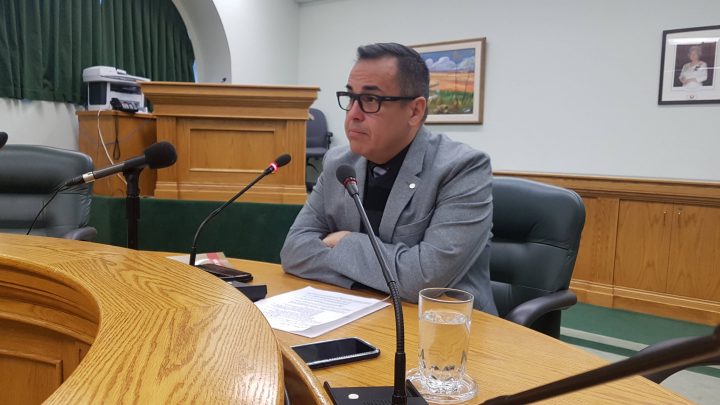Saskatchewan’s advocate for children and youth, Corey O’Soup, considers mental health to be the main issue pacing the province’s young people.

In his 2017 report, O’Soup said he wanted to focus on positive work that is being done to help kids. This year’s report includes highlights of several positive initiatives, like a photography club in the northern village of Pinehouse, but the advocate’s press conference took on a more critical tone.
“Our numbers are staying relatively flat or getting worse. If we don’t focus, if we aren’t a little more critical, then those numbers won’t get any better,” O’Soup said.
Statistics O’Soup used to back this up include the rate of child suicides, which grew from two in 2017 to eight in 2018. The advocate’s office found Indigenous boys are nine times more likely to die by suicide than non-Indigenous boys. That ratio skyrockets to 29 times more likely by suicide for Indigenous girls.
“I believe suicide deaths are some of the most preventable, and if we invest in children and youth and take seriously their mental health I believe we can prevent most of these deaths,” O’Soup said.
The advocate said he is encouraged to see further mental health resources being implemented in schools on a broad scale and unique community-driven programs, but said the province needs to play a lead role.
He noted that mental health spending increased in this year’s budget, but would want to see the Saskatchewan be a national leader in mental health spending. Currently, the amount of Saskatchewan’s health budget that goes to mental health is below the national average.
“The wait times experienced for mental health services by children and youth of this province are shameful,” O’Soup said.
In 2018, the wait for child psychiatric services could be as long as two years in parts of the province like Saskatoon. O’Soup gave credit to recent developments, like a specialty mental health triage unit at Saskatoon’s Royal University Hospital, to dropping waits to 15 months.
Health Minister Jim Reiter was pleased to see O’Soup note improvements in his report, but admitted there is more to do. Decisions are being finalized on how to use some of this year’s mental health resources.
“There’s a number of dollars that have been allocated that we still have to decide exactly where they’re going to go and what they’re going to do. But generally, speaking we’re going to be adding more boots on the ground. There’s going to be more mental health professionals hired and that’s going to include the north,” Reiter said.
More details are expected on where and when these resources will be allocated in “the next number of weeks.”
Reiter said wait times for child psychiatric services in Saskatoon are down to 12 to 13 months in Saskatoon, but that is still too long. The minister said there are shortages of these positions across the health system nationally.
Three areas have these services; Prince Albert, Regina and Saskatoon. Waits in Prince Albert and Saskatchewan are around four weeks and four months respectively, according to Reiter.
Education and social services
Further shortfalls O’Soup highlighted include a 44.5 per cent Indigenous high school graduation rate compared to 85 per cent for non-Indigenous students, and 80 per cent of children in Saskatchewan’s child and family services (CFS) system being Indigenous. The national average is around 50 per cent.
Last year, the advocate’s office investigated 20 child deaths and 45 critical injury incidents. Most cases involved kids in some kind of CFS program or corrections. O’Soup said they found program gaps in all investigations.
Social Services Minister Paul Merriman said the province has been working to improve relations with First Nations communities – pointing to 18 service agreements signed with Indigenous CFS organizations. He added they work to keep children who come into care with family members, and apprehension is a last resort, but the field has unique challenges.
“What I’m hearing from my staff and from the social workers is there are very complex cases. Nothing within social services is cut and dry,” Merriman said.
Future steps
In trying to address some of these systemic issues O’Soup sees two main ways solutions can be reached. First, listening to what kids have to say. In late 2017, the advocate’s office published a youth driven report “Shhh…Listen! We have something to say. Youth voices from the North.”
“First thing I would do is encourage them to listen; listen to our kids, listen to our communities. Solutions can’t come from this building. Solutions have to come from our communities. Solutions have to come from our young people,” O’Soup said.
The advocate’s office will be hosting a mental health conference for decision makers and community organizations in Saskatoon on May 9 and 10. The emcess and presenters will all be youths.
Education is second piece of how to mend issues facing Saskatchewan’s youth. O’Soup, who previously worked as a teacher, believes education is the key to breaking destructive family cycles of violence, drugs, abuse, suicide and other systemic woes.
The advocate’s office is currently working on two special reports, one centered on mental health slated for release in early 2020 and another on youth suicide.




Comments